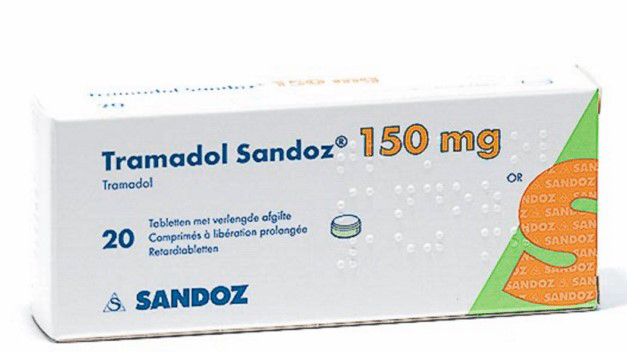Tramadol Generic (Ultram) 150mg
Details
 Tramadol is used to relieve moderate to moderately severe pain, including pain after surgery. The extended-release or long-acting tablets are used for chronic ongoing pain. Tramadol belongs to the group of medicines called opioid analgesics. It acts in the central nervous system (CNS) to relieve pain. When Tramadol is used for a long time, it may become habit-forming (causing mental or physical dependence). Physical dependence may lead to side effects when you stop taking the medicine.
Tramadol is used to relieve moderate to moderately severe pain, including pain after surgery. The extended-release or long-acting tablets are used for chronic ongoing pain. Tramadol belongs to the group of medicines called opioid analgesics. It acts in the central nervous system (CNS) to relieve pain. When Tramadol is used for a long time, it may become habit-forming (causing mental or physical dependence). Physical dependence may lead to side effects when you stop taking the medicine.
This medicine is available only with your doctor's prescription.
Before Using Ultram
In deciding to use a medicine, the risks of taking the medicine must be weighed against the good it will do. This is a decision you and your doctor will make. If you decided to take Tramadol, the following should be considered:
Tramadol is a synthetic opioid and was developed by the German pharmaceutical company Grünenthal GmbH in the late 1970s. Tramadol is often categorized as an opioid, although it is chemically not related to the opioid class of drugs. Tramadol is usually marketed as the hydrochloride salt (tramadol hydrochloride). It is an analgesic which acts through the central nervous system and is used for the relief of moderate to severe pain. It is used for a variety of conditions and is of particular use for fibromyalgia and restless leg syndrome. Tramadol is often used when constant relief is needed for chronic pain. The drug has high addictive potential because it produces euphoria and is also serotonergic and noradrenergic.
How does Tramadol work?
Tramadol is believed to produce its analgesic effect by inhibiting the reuptake of norepinephrine and stimulating the release of serotonin. In addition it has an antagonist for a wide range of neuroreceptors. It is also a mild agonist of the µ-opioid receptors. It is known however to have additional non-opioid effects although these are not fully understood. Tramadol is a 5HT2C antagonist and it is thought that this could be involved in the effectiveness of the drug in relieving symptoms of depression and obsessive-compulsive symptoms in patients with neurological diseases involving pain.
Tramadol is more effective than codeine in relieving chronic pain but slightly less effective than hydrocodone.
How to take
Take this medication orally as prescribed. It is usually taken every 4 to 6 hours as needed. Use this medication exactly as prescribed. Do not increase your dose, use it more frequently or use it for a longer period of time than prescribed, because this drug can be habit-forming. Also, if used for an extended period of time, do not suddenly stop using this drug without your doctor's approval. When used for extended periods, this medication may not work as well and may require different dosing. Consult your doctor if the medication stops working well.
Side effects
This medication may cause dizziness, weakness, in-coordination, nausea, stomach upset, constipation, headache, drowsiness, anxiety, irritability, dry mouth, or increased sweating. If any of these effects persist or worsen, inform your doctor. Notify your doctor if you develop any of these serious effects while taking this medication: chest pain, rapid heart rate, skin rash or itching, mental confusion, disorientation, seizures, tingling of the hands or feet, trouble breathing. In the unlikely event you have an allergic reaction to this drug, seek immediate medical attention. Symptoms of an allergic reaction include: rash, itching, swelling, dizziness, breathing trouble. If you notice other effects not listed above, contact your doctor or pharmacist.
Precaution
Tell your doctor your medical history, especially of: kidney disease, liver disease, seizure disorder, lung disease, history of drug or alcohol dependency, any allergies you may have. Limit alcohol as it may add to the dizziness or drowsiness effects caused by the medication. Because this drug may make you dizzy/drowsy, use caution performing tasks requiring alertness such as driving. This medication should be used only when clearly needed during pregnancy. Discuss the risks and benefits with your doctor. Tramadol is excreted into breast milk. Because the effects on a nursing infant are not known, consult your doctor before breast-feeding.
Drug interactions
Inform your doctor of all prescription and nonprescription medications you may use, especially of: carbamazepine, narcotic pain relievers (e.g., codeine), drugs used to aid sleep, antidepressants (e.g., SSRI-types such as fluoxetine or fluvoxamine), MAO inhibitors (e.g., furazolidone, linezolid, phenelzine, procarbazine, selegiline, tranylcypromine), psychiatric medicine, "triptan"-type drugs, anti-anxiety drugs (e.g., diazepam), sibutramine. Also, report use of certain antihistamines which are also present in many cough-and-cold products. Do not start or stop any medicine without doctor or pharmacists approval.
Missed dose
If you miss a dose, take it as soon as remembered; do not take it if its near the time for the next dose, instead, skip the missed dose and resume your usual dosing schedule. Do not double the dose to catch up.
Storage
Store this medication at room temperature between 59 and 86 degrees F (15 to 30 degrees C) away from heat and light. Do not store in the bathroom. Keep this medication and all other medications out of the reach of children.














